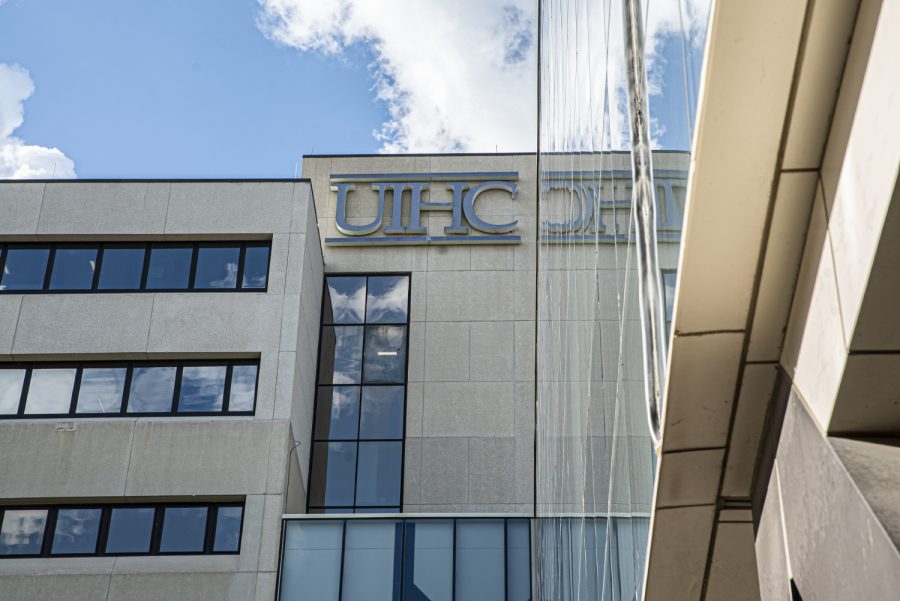UIHC CEO says its ready for surge capacity as COVID-19 hospitalizations climb
University of Iowa Hospitals and Clinics CEO Suresh Gunasekaran said UIHC is preparing to begin the first phase of their plan to increase capacity and change quarantine procedures for hospital staff as cases in Iowa surge.
University of Iowa Hospitals and Clinics are seen on Tuesday, June 23, 2020.
November 5, 2020
As Iowa experiences record coronavirus case counts and hospitalizations ahead of the coming winter months, University of Iowa Hospitals and Clinics is making changes to staffing on COVID floors, increasing bed space, and changing quarantine guidelines for hospital staff to prepare for the surge.
The number of Iowans in the hospital because of COVID-19 has skyrocketed in recent weeks. Thursday night, 912 Iowans were in the hospital according to the state’s coronavirus dashboard, yet another record.
UIHC Chief Executive Officer Suresh Gunasekaran said the hospital is ready to care for as many patients as possible as rates of COVID-19 infections and hospitalizations increase. This is the first time UIHC has had to implement a full surge plan, he said, but believes the hospital is prepared.
“We are absolutely prepared for a surge and being able to implement this. However, we’re also profoundly worried about what it means to the overall health-care system if we have to do it,” he said. “We continue to be significantly concerned about all of the patients coming from around Iowa that continue to be vulnerable.”
Gunasekaran said UIHC is ready to implement the first phase of the hospital’s three-phase plan if they don’t see a decrease in cases within the next couple of weeks. He said this plan includes expanding the number of Intensive Care Unit (ICU) beds, testing capacity, and increasing the staff for the Influenza Like Clinic (ILI) at UIHC.
RELATED: UIHC CEO recommends rethinking holiday plans amid worst chapter of COVID-19 pandemic
One of the biggest changes in preparing for surge capacity is staff quarantine procedure. Previously at UIHC, staff members who were exposed to someone who had the virus would have to miss work for two weeks.
Now, if staff members are asymptomatic and receive a negative COVID-19 test, they are expected to come into work, Gunasekaran said, partly due to the strain the virus has had on the hospital.
“We have had a significant population of workers who have been exposed to someone who is COVID positive and have been out on quarantine,” he said. “An asymptomatic staff member who has been exposed to someone who has COVID will be coming to work.”
He said the hospital is planning to add 16 ICU beds during the first phase of their plan. If it gets to the point of phase three, their maximum number of beds would be 200 — a 100-bed increase from their current capacity.
“For us to be able to stand up this additional capacity, we will have to reassign staff from other parts of our health-care operations. This will then cause us to have to reduce our non-urgent and emergent surgeries, as well as, reduce some of our clinic patients,” Gunasekaran said. “These are some of the changes that will be necessary in order to make sure that we can safely and stably staff this increased capacity across the hospital.”
With these changes, Gunasekaran said UIHC plans to take fewer patients in the clinic, operating rooms, and some procedure areas. Hospital staff will have more shifts on the COVID-19 floors to make sure they can have more patients in the ICU beds.
Gunasekaran believes the capacity should increase by Nov. 16, and should be able to stay at that capacity until Jan. 3.
The hospital also plans to make changes in visitor rules, he said, modifying the hours for adult inpatient visitors and visitors for patients who are getting procedures done.
Johnson County Public Health approved an extension to Iowa Gov. Kim Reynolds’ Declaration of the Public Health Disaster Emergency on Thursday to be effective until Dec. 11, or as long as Reynolds’ State Disaster Declaration remains in effect.
Reynolds announced on Tuesday that Iowa’s hospitals and county public health departments would receive $28 million in Coronavirus Aid, Relief, and Economic Security Act funding.
Gunasekaran said during a press conference on Thursday that he’s not sure yet what the hospital plans to do with the money, but it is looking at providing additional compensation for staff, recruiting additional staff, and contracting staff from other hospitals.
Gunasekaran called on Iowans to make significant changes to avoid needing this surge plan. In addition to wearing face coverings, practicing good hand hygiene, social distancing, and avoiding large gatherings, he said public awareness about the virus is crucial to stopping the spread.
RELATED: Reynolds launches new ad campaign to promote responsible COVID-19 behavior
“Public awareness is the only thing that will mitigate the spread of the disease,” he said. “We know that this infection rate is so high and so robust across all Iowa communities. It means that we know enough Iowans are not taking it seriously.”
Despite these changes and the potential for surge capacity, UIHC is still seeing patients and providing medical care.
“We want to encourage all patients and all members of the community to still continue to take advantage of UI health-care,” Gunasekaran said. “We are here, we are stable, we are able to take care of everyone.”



